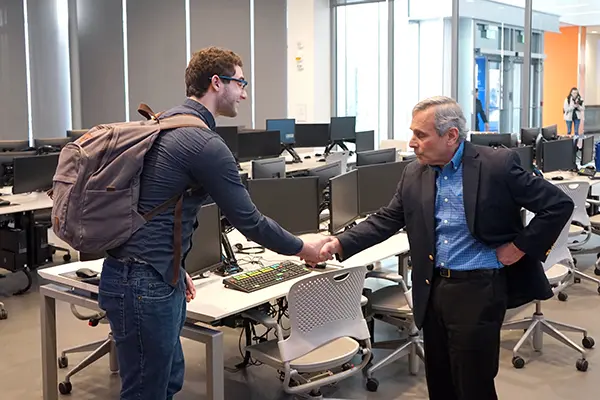Executive-in-Residence Richard Grande Explains Investing – and Why Dreams are ‘Dumb’
 Image by Ed Brennen
Image by Ed Brennen
01/29/2019
By Ed Brennen
Don’t follow your dreams and don’t save for retirement.
Those were just two of the seemingly unorthodox pieces of advice that alum Richard “Dick” Grande shared with Manning School of Business students during his recent Executive-in-Residence visit.
Grande, who earned bachelor of science degrees in mathematics and industrial management in 1972 and a master’s degree in finance in 1980, is managing director and wealth manager at First Republic Investment Management in Boston.
Speaking to students in Prof. Chan-Wung Kim’s financial management course and later to a group of students from the Manning Leaders Council, Grande deftly weaved straight-talking humor with practical financial advice as he discussed his 40-plus years of investment experience.
“Do not follow your dreams – that’s dumb,” said Grande, who told students he once dreamed of playing professional football. “Look at my size. That dream would have been a nightmare.
“Follow your talents instead. Think about what you’re really good at, and then wrap your dream around that.”
 Image by Ed Brennen
Image by Ed Brennen
Grande, who has worked as managing director at Bank of America Securities and as a senior vice president at Morgan Stanley, also shared investment tips with students.
“Don’t save for retirement or your kids’ education – invest your money,” said Grande, who added that putting money in the bank is the “single dumbest thing you can do.”
He said the “secret algorithm” to making money is to find an investment – real estate, stocks, even selling on eBay – that has free cash flow 5 percentage points higher than the risk-free rate of return. “So if the 10-year treasury rate goes to 10 percent,” he explained, “you need to get 15 percent from your investment.”
Grande also told students never to invest in airlines (“Ten things can happen, and nine are bad. You have huge capital costs, insurance, unions, weather.”) or commodity stocks (“A commodity can always get substituted by another commodity” if the price goes up.)
Grande implored students to get off their phones and “see what’s going on around you.” He encouraged them to read as much as they could, particularly The Economist. And when students apply for internships, Grande said they shouldn’t just email the human resources department, but instead call people they’d be working under or knock on doors. “You might get in,” he said.
 Image by Ed Brennen
Image by Ed Brennen
Grande, who received a University Alumni Award last spring, has served on the Manning School’s Advisory Board since 2006 and taught finance classes as an adjunct. But this was his first visit as Executive-in-Residence.
“It’s a lot of fun telling students what you’ve learned from your mistakes, and I’ve got a lifetime of them,” Grande said with a grin.
In addition to endowing a major scholarship to benefit finance students, Grande endowed the Pulichino Tong Business Center’s front plaza in memory of his father and mother, Lucian and Josephine, and his wife’s parents, Francis and Nora Tomaney.
“It’s really special when you get to see the people behind the names that are all over this building,” Manning School Dean Sandra Richtermeyer said. “And students love to have alumni come back and be real.”
One of those students was Oliver Jennings, a junior from Natick who is majoring in biotechnology and minoring in business. After class, he thanked Grande for coming and asked for some bonus post-grad career advice.
“I really enjoyed the talk,” Jennings said.




